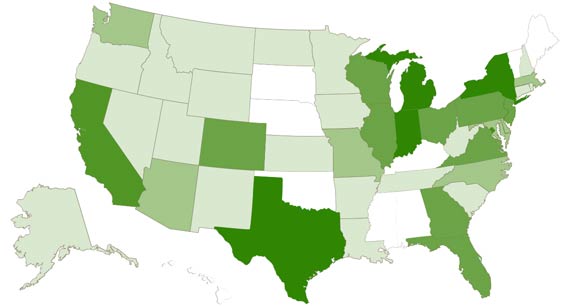
Resources:


Possible Careers:
• Software engineers
• Data scientists
• Systems analysts
• Information security analysts
• Web developers
Estimated Starting Salary:
• $65,000 - $75,000
Source: Zippia.com
Source: Zippia.com
Undergraduate Degree - Computer Science
The Bachelor of Science degree in Computer Science focuses on the analysis, design, and development of software and hardware computer systems. Computer Science applies creativity, logic, and computational thinking to solve problems important to science, healthcare, education, business, entertainment, government, and all aspects of modern life. Students develop the fundamental programming skills for building software systems and are introduced to a wide range of algorithms, data structures, and patterns that can be applied to problem-solving. A range of elective courses allows a student to customize the degree in this expansive field to their interests. Complementing these major areas, the cognate provides an excellent opportunity to develop an individually selected area of interest.
Students who are enrolled in the Bachelor of Science degree program with a major in computer science may elect a Minor in Game Design and Development. For additional information, refer to the Minor in Game Design and Development statement in the Department of Media and Information section of this catalog.
The Bachelor of Science degree program in Computer Science is accredited by the Computing Accreditation Commission of ABET, www.abet.org.
Requirements for the Bachelor of Science Degree in Computer Science
- The University requirements for bachelor's degrees as described in the Undergraduate Education section of this catalog; 120 credits, including general elective credits, are required for the Bachelor of Science degree in Computer Science.
The University's Tier II writing requirement for the Computer Science major is met by completing Computer Science and Engineering 498, referenced in item 3. b. below.
Students who are enrolled in the College of Engineering may complete the alternative track to Integrative Studies in Biological and Physical Sciences that is described in item 1. under the heading Graduation Requirements for All Majors in the College statement. - The requirements of the College of Engineering for the Bachelor of Science degree.
The credits earned in certain courses referenced in requirement 3. below may be counted toward College requirements as appropriate. - The following requirements for the major:
a. Bioscience - Courses may not be used to satisfy both (1) and (2) below (4 to 6 credits): (1) One of the following courses: BS 161 Cell and Molecular Biology 3 ENT 205 Pests, Society and Environment 3 IBIO 150 Integrating Biology: From DNA to Populations 3 MMG 141 Introductory Human Genetics 3 MMG 201 Fundamentals of Microbiology 3 PLB 105 Plant Biology 3 PSL 250 Introductory Physiology 4 (2) One of the following courses: 4 BS 171 Cell and Molecular Biology Laboratory 2 CEM 161 Chemistry Laboratory I 1 CEM 162 Chemistry Laboratory II 1 PHY 191 Physics Laboratory for Scientists, I 1 PHY 192 Physics Laboratory for Scientists, II 1 PLB 106 Plant Biology Laboratory b. All of the following courses (32 credits): CSE 232 Introduction to Programming II 4 CSE 260 Discrete Structures in Computer Science 4 CSE 300 Social, Ethical, and Professional Issues in Computer Science 1 CSE 320 Computer Organization and Architecture 3 CSE 325 Computer Systems 3 CSE 331 Algorithms and Data Structures 3 CSE 335 Object-Oriented Software Design 4 CSE 498 Collaborative Design (W) 4 MTH 314 Matrix Algebra with Computational Applications 3 STT 351 Probability and Statistics for Engineering 3 c. An additional five courses selected from the following (15 credits): CSE 402 Biometrics and Pattern Recognition 3 CSE 404 Introduction to Machine Learning 3 CSE 410 Operating Systems 3 CSE 415 Introduction to Parallel Programming 3 CSE 420 Computer Architecture 3 CSE 422 Computer Networks 3 CSE 425 Introduction to Computer Security 3 CSE 431 Algorithm Engineering 3 CSE 435 Software Engineering 3 CSE 440 Introduction to Artificial Intelligence 3 CSE 450 Translation of Programming Languages 3 CSE 460 Computability and Formal Language Theory 3 CSE 471 Media Processing and Multimedia Computing 3 CSE 472 Computer Graphics 3 CSE 476 Mobile Application Development 3 CSE 477 Web Application Architecture and Development 3 CSE 480 Database Systems 3 CSE 482 Big Data Analysis 3 CSE 491 Selected Topics in Computer Science 1 to 4 MTH 451 Numerical Analysis I 3 d. Required Cognate (15 credits): Cognates in the following areas are available to students in Computer Science: business, communication arts and sciences, foreign language, mathematics, the natural sciences, philosophy, psychology, the social sciences, and telecommunication. Students may complete cognates in other areas with the approval of the Department of Computer Science and Engineering academic advisor. The cognate should enhance the student’s ability to apply analytical procedures in a specific subject area. The cognate requires a minimum of four courses totaling 15 or more credits outside the College of Engineering selected from (1) or (2) below. The academic advisor of the Department of Computer Science and Engineering must pre approve both the cognate and the cognate courses. (1) At least 6 of the 15 credits must be in courses at the 300-400 level. The cognate in The Eli Broad College of Business requires a specific set of courses: ACC 230, EC 201, FI 320, GBL 323, and MKT 327. (2) A sequence of at least four courses in a foreign language.
Source: Michigan State University - Information listed is intended for educational purposes only, degree requirements are property of Michigan State University.